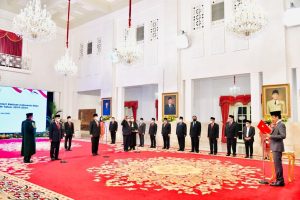Indonesian President Joko Widodo yesterday announced a reshuffle of his cabinet, levering a veteran politician and former armed forces chief into key ministerial roles.
Jokowi, as he is commonly known, selected Zulkifli Hasan, 59, a former forestry minister and deputy speaker of the Indonesian legislature, to take the role of trade minister. Zulfiki tipped out Muhammad Lutfi, who had been blamed for his spiraling prices of basic foodstuffs, particularly cooking oil, that prompted a run of student protests and saw Jokowi’s approval ratings fall to a six-year low.
With domestic prices of cooking oil rising due to the Russia-Ukraine war, Jokowi’s administration imposed the ban on palm oil exports in late April, after subsidies, export permits, and a palm oil levy, had all failed to tame prices. The move led the price of edible oils to double on global markets and cost Indonesian exporters tens of millions of dollars – but without making a significant dent in the domestic price of cooking oil. The government scrapped the export ban last month.
Upon his inauguration yesterday, the Associated Press reported, Zulkifli told a news conference that he would quickly tackle the cooking oil shortage, making it available “anywhere at an affordable price.”
Zulkifli is also the chairman of the National Mandate Party (PAN), which joined Jokowi’s burgeoning big-tent ruling coalition last year, giving him the support of seven of the nine parties and 81 percent of the lawmakers in the 575-member lower house. The 59-year-old politician is clearly qualified for the role, but his appointment can also be interpreted as a political reward for bringing the Islam-inflected PAN out of opposition.
The other major cabinet change was Jokowi’s choice of Hadi Tjahjanto, the former commander of the Indonesian Armed Forces (2017-2021), to replace Agrarian and Spatial Planning Minister Sofyan Djalil. Speaking to reporters, Hadi said that among his main duties would be to to resolve land disputes across the archipelago and prepare the ground for the construction of Indonesia’s new capital, Nusantara, on the island of Borneo, the Straits Times reported.
“My job is firstly to address the backlog in the issuance of land titles to the people, secondly, rampant land disputes, and thirdly, any land issue for the planned new administrative capital,” he said.
Hadi joins the clutch of former generals and military commanders that hold posts in Jokowi’s cabinet, including Defense Minister Prabowo Subianto, Religious Affairs Minister Fachrul Razi, and Home Affairs Minister Tito Karnavian, the former head of the national police. Then there is ministerial troubleshooter Luhut Pandjaitan, who, like Prabowo, was a senior commander under Suharto’s New Order regime, who serves as coordinating minister for maritime affairs and investment and is one of Jokowi’s closest aides.
In a broader sense, Hadi’s appointment reflects the growing political prominence of former military figures in civilian politics since Jokowi took office in 2014. In an article published last year by the Washington-based Brookings Institution, Natalie Sambhi argued that this involvement amounted to a partial resurrection of the Suharto-era doctrine of dwifungsi, or “dual function,” under which the military played an active role in the affairs of the state.
“The military is gaining greater ground in the civil-military balance, with a shift away from civilian authority,” she wrote, noting “the appointment of several New Order figures in politics, increased reliance on the army’s territorial system, and a greater ability for retired officers to shape public discourse and policy.”
After the new ministers were sworn in, Jokowi told reporters that he had “considered everything” in making the appointments, including “their track record, experience, and especially their managerial skills.” He added, “We need detail-oriented, hands-on people.”

































